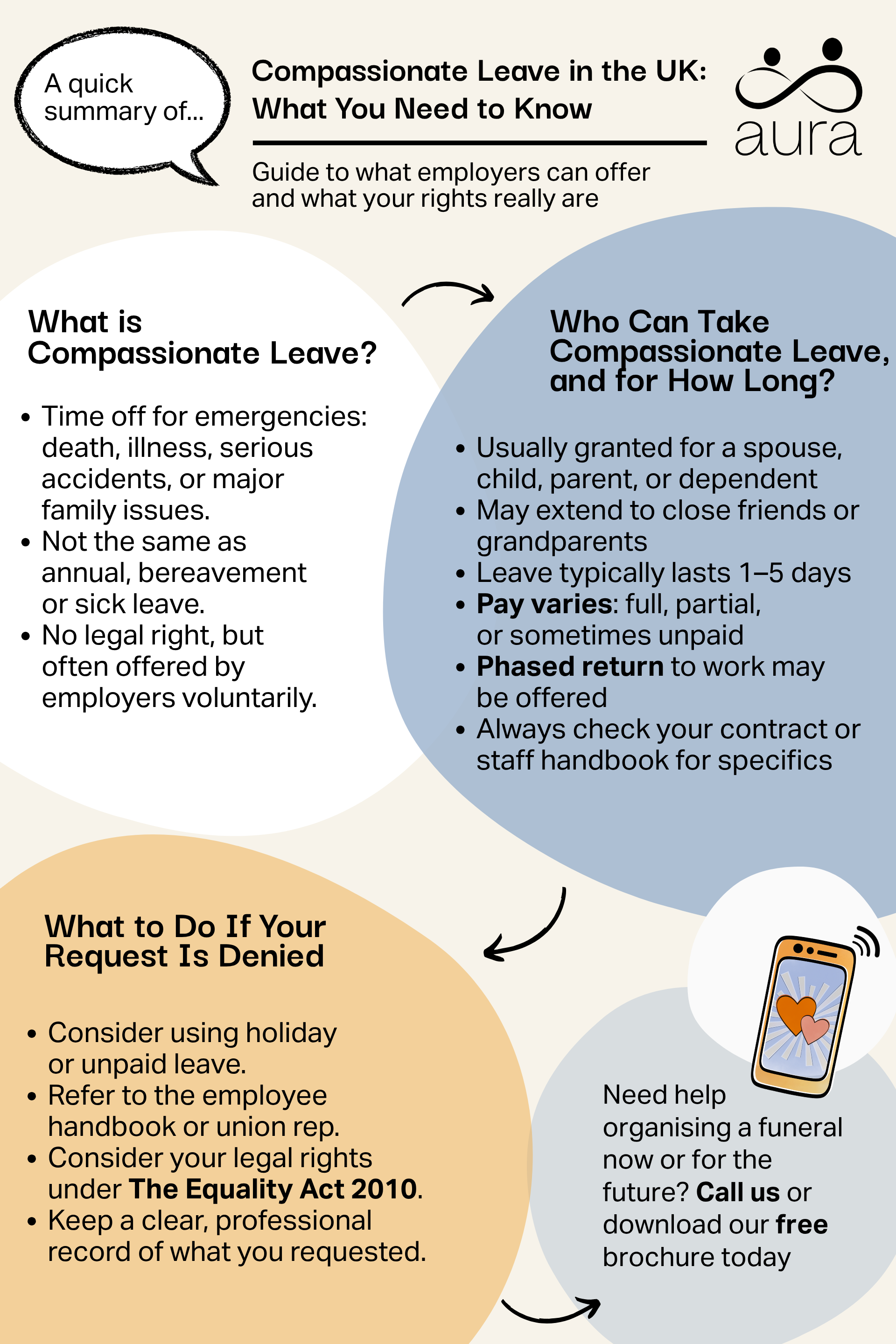


Written by Emily Cross.
20 minute read

Article reviewed by Laura Rivet, HR Consultant on June 6, 2025.
An expected event such as a death, illness, or serious accident involving your child, partner, or someone close to you may feel like it has instantly turned your life upside down. It is understandable to feel a mixture of loss, anger, upset, and frustration, as well as to feel that the rest of the world is unaware of what you’re currently going through. At times like this, it may help to consider what kinds of help you may be entitled to.
While our core responsibility is to provide families with direct cremation services so they can grieve how they feel appropriate, we also believe strongly in reaching out and doing more. With this in mind, this guide will talk you through everything you need to know about compassionate leave in the UK today.
Taking time off from work so that you can accept what has happened, process your emotions, and start making funeral arrangements, if applicable, may help give you the time and space you need. The important point to note is that compassionate leave extends far beyond death in the family and is designed to provide you with help and support at a time when it is understandable if you feel like you are struggling.
We hope you will find some words of comfort and support in the lines that follow.
Key takeaways:

We see our role as a family-run funeral provider to use our experience in the industry as a way to provide you with many of the answers and solutions you may be looking for right now. Compassionate leave is a specific type of leave distinct from annual leave or sick leave that employers have the right to grant if you are experiencing an emergency. This could be the death of a loved one, an illness or serious accident, or a family issue that requires you to travel.
At the time of writing, there is no statutory right to compassionate leave which means, in principle, your request may be refused. That said, employer policies and ACAS guidance still apply and employers typically accept compassionate leave requests in one form or another.
Knowing what bereavement support is available may help you to make decisions that protect your emotional and mental well-being at a time when it is understandable if you feel isolated.
Whether or not the employer will grant you compassionate leave will depend on how close you are to the person who has died or the person who has been affected. If it is your parent, child, spouse, or sibling then in the vast majority of cases your employer will grant your request, although it’s important to note that they are not legally obligated to do so.
Compassionate leave may also be granted for grandparents and close friends, especially if they have come to rely on you for care and support. There may be cases where the employer offers a lesser amount of compassionate leave than you request, or only offers partial payment of wages after a certain date when you had expected to receive full pay. While this may come across as uncaring and be something you find upsetting, there are a series of recourse options that we will touch upon in more detail later in this guide.
There is no overarching law that states employers are legally obligated to provide compassionate leave on full pay, although many employers choose to offer it. Employers who choose to offer this type of leave to full-time and part-time staff will do so on a pro-rata basis where you will be paid for the hours you would have worked had you been in work. This means that if you work part-time, you will receive your regular part-time wage for as long as your employer is willing to pay it.
Government guidance on compassionate leave is geared towards encouraging employers to be flexible and caring as much as possible and focuses on the level of need of dependents. For example, if a child is involved in a serious accident and requires constant care for a period of time, this would likely take precedence over a short-term injury or illness to a distant relative or friend who was not previously dependent on you. The tricky part here is that your employer has the right to grant, or refuse, compassionate leave on a case-by-case basis, so you may feel that their decision contains a degree of arbitrariness.
Either an employment contract or company policy should have a distinct section that outlines the company’s position with regard to compassionate leave. Although reviewing this type of legalese may not be something you feel you can do at a time of understandable emotional stress, knowing that it is there and in writing may provide a sense of reassurance at this time.

Issues like trying to cope with the death of a parent can be challenging enough without having to worry about returning to work or meeting financial obligations. Employers are aware of this and are expected to make reasonable efforts to accommodate your request.
A common duration for compassionate leave would be 1–5 days, but this can vary significantly depending on a variety of factors:
Because there is a lack of standard entitlement under UK law, the initial act of requesting leave can prove to be stressful. Some may feel uncomfortable requesting a specific amount of time off, especially if they do not know how long it will take to put things right or to come to terms with a death. In these instances, it may be easier to outline the situation with the designated HR contact and take things from there.
One of the difficult things to accept at this difficult time is that the precise amount of payment you will receive during the course of compassionate leave depends on the employer’s in-house policy. Your contract or company policy may state a set amount and duration or it may be worded in such a way that it is going to be decided on a case-by-case basis.
Employers have the right to offer full, partial, or no pay during compassionate leave. Because they are encouraged by the government to be considerate and compassionate, many will offer at least partial payment with the option to arrange a phased return to work. Many employers who take this approach see it as an important way of showing employees that they care and ultimately increasing their long-term retention rates. That said, if a low amount or no pay is offered, this is by no means a sign that the company doesn’t value you or wishes you to resign.
Requesting time off immediately after a death or accident and then later on if you need additional compassionate leave for a funeral will follow a standardised process. Your in-house HR team will be able to guide you through the specific things you need to know. The general points to be aware of are as follows.
Most companies will structure their compassionate leave requests in the following way:
Admin and bureaucracy may understandably feel like unwanted red tape at such a difficult time, but the system is actually set up to protect your rights. Knowing that everything is going to be handled with transparency, fairness, and respect may provide some peace of mind when you simply need the time and space to focus on something that is more important than work.
A common misconception amongst people who have experienced a death or serious incident is that their company simply doesn’t care about things such as the five stages of grief or how their life has changed. Remembering that the HR department you are dealing with is staffed by real people just like you, and they have empathy for you, may help remove some of the stress that these types of processes may understandably cause.
Requests are handled and reviewed as quickly as possible and are typically prioritised so that a same-day or next-day response can be provided. Sometimes the company’s policies may require HR personnel to reach out and seek written confirmation or some specified type of proof. Endeavouring to reply at your earliest opportunity can help to speed up the process of getting compassionate leave in place.
Compassionate leave is not legally standardised in the UK, and this means that every employer has the right to make their own determination. While most will err on the side of compassion and fairness, there is always a possibility that you will feel your issues have not been appropriately considered. In cases like this, you may wish to refer to the employee handbook or highlight a case you are aware of that was similar in nature but that had a very different outcome.
Because emotions can run high at times like these, you may find it a little easier to do everything through a line manager or supervisor who you report to on a daily basis. Their personal relationship with you may make it easier for you to express your needs and lay out a compelling case to the HR department.
Government guidance encourages flexibility and compassion, while ACAS makes the following recommendations for employers who are managing compassionate leave in the UK:
Having some awareness of the above and then combining this with the specific wording in your employment contract may provide insight into how much compassionate leave you are likely to be given. It may also be the case that you are uncertain about how long you will be attending to other matters, in which case your employer may set up a rolling leave agreement subject to receiving regular updates on your status.
A bereavement in the workplace may cause a series of knock-on effects that you have understandably not even considered yet. Purely to provide context with a view to putting your mind at ease, you may wish to make yourself aware of the following key points:
If you feel that you are emotionally able to help with any form of handover activity that is required, this is something that your line manager will appreciate. It may also generate some goodwill which could then have your request for leave looked on more favourably, although we should stress that this is never a guarantee of getting accepted.
No, compassionate leave and bereavement leave are not the same in the UK. Bereavement leave is solely for when someone dies, whereas compassionate leave covers death, illness, injury, and changes in who is dependent on you.
The problem is that some companies will use the two terms interchangeably, while others will have a separate and distinct policy for bereavement leave and compassionate leave. Outlining the specifics of your situation — as much as you feel comfortable or able to — with HR will ensure that your request is assessed using the correct policy.
If you are dealing with the death of a loved one, we want you to know that we are always here to help. We have a guides as well as an online resource that talks you through what to do when someone dies in a more general setting, in addition to many others. Some employers may also have made provisions with third–party counsellors or grief specialists that they may be able to redirect you to if you so wish.
Compassionate leave is never guaranteed in the UK because it is not a legal obligation, but the vast majority of employers follow the Government’s guidance to be fair and considerate. Common cases where compassionate leave is granted include:
Tragically, suicide remains one of the leading causes of death within certain age groups and demographics. If you are affected by this and want to know how to cope with the suicide of a loved one, we have prepared a guide that we hope can help.
According to ACAS, everyone has the right to a reasonable amount of time off to deal with emergencies involving dependents. If you feel you have been treated unfairly, you have the right to appeal under the Discrimination and the Equality Act 2010, as well as the right to follow an in-house grievance process laid out in the company’s internal handbook.
A clear written account of your situation, the nature of the leave requested, and what was ultimately granted need to form the basis of any appeal. A description of anything seen as unfair or unreasonable should also be included, but trying to remain professional and not writing emotionally is important.
Industries with unionised workforces will likely have collective agreements that have been negotiated by the union with the employer on behalf of the employees. If you are a card-carrying union member, you may find it helpful to connect with your local union representative to better understand your rights. In many cases, they may be able to guide you through how to put in a request for compassionate leave that ensures you stand the best possible chance of getting everything approved that you ask for.
Compassionate leave is not solely about dealing with the immediate aftermath of a death or serious event in your personal life. You may find that during the course of a phased return to work you need to take an additional block of time off to attend the funeral. Having a clear idea of what type of leave you take for a funeral may help you ensure that you can pay your respects with minimum stress from outside factors such as your work-life balance.
At a time when you are having to deal with something that may be unexpected, upsetting, or even distressing, it is understandable if you come to reflect on your own place in the world. If your experience makes you want to take steps to put your affairs in order, you may wish to connect to discuss our prepaid funeral plans when you feel able to. We have also created an online resource where we compare funeral plans should it prove useful to you.
Terms and conditions apply, you will receive a funeral plan summary before purchase.
No matter what you are going through right now, it’s important to remember that you are never alone. The vast majority of employers focus more on the moral obligation they have for their staff than the fact that they have no legal obligation. Reaching out and discussing your situation with them at the earliest opportunity could make a real difference to your ability to deal with the events that have happened.

Our brochure includes all the details you need surrounding our prepaid direct cremation funeral plans.
Get your free brochure sent by email or First Class post by clicking on the link below.
Compassionate leave is time off in the event of death, illness, injury, or other unforeseen circumstances that the employer deems serious enough. While it is not a legal obligation, the vast majority of employers will focus on the government guidance that urges them to be flexible, accommodating, and compassionate when dealing with such issues.
Your employer does not have to pay you during your period of compassionate leave if this is not something that is explicitly protected and stated in your employment contract. A common practice is a short period of full pay followed by either a phased return to work or a drop-down to continued leave on part-time wages.
Most employers offer 3-5 days of leave on compassionate grounds, but they are under no legal obligation to do so. PBL can be taken within 56 weeks of the death of a child under 18, or the stillbirth of a child older than 24 weeks, and covers two weeks on full pay. PBL is protected by law and must be granted by every employer in the UK. There are also options for it to be divided between the mother and father should they wish to do so.
You do not have the right to paid compassionate leave after a death in the family, but many employers will offer it as they see it as their moral obligation. It’s also important to know that the Employment Rights Act 1996 gives you the right to request “reasonable” time off, with the reasonableness of the request being assessed by the employer. The Government encourages all employers to make their judgements in a way that is fair, transparent, and consistent. The goal is to make sure that every employee feels respected and supported so that they are more likely to be able to make a return to work.
Your employment contract or the company handbook will typically talk you through the specific steps involved. Alternatively, you may find it less stressful to talk directly to a trained member of the HR team who will be well-versed in dealing with topics of such a sensitive nature. They may ask you to provide evidence in the form of a note from your doctor or to sign something that confirms everything you have provided is true to the best of your knowledge.
No, strictly speaking, bereavement leave is a specific type of compassionate leave that applies when someone close to you has died. The difficulty is that some companies use these two terms interchangeably while others have distinct policies for each type of leave.
No, but UK law does guarantee your right to ask for time off during a death or emergency and to receive it. This means that even if you do not receive paid compassionate leave, you may be able to take some combination of paid annual leave or unpaid sick leave to cover the length of time you need to be off work.
Yes, an employer is within their rights to turn down and deny a request for compassionate leave, but many see it as a moral obligation even though there is no legal obligation. If your request is turned down, you have the right to request using annual leave and vacation time as well as to take unpaid leave to cover the amount of time in your initial compassionate leave request.
Should you feel that your case has been handled unfairly, the best approach may be to discuss the format of the internal dispute and grievance policies with HR. If you are unionised, contacting your local union representative and asking them to arbitrate on your behalf as part of a collective bargaining agreement may prove to be less stressful than attempting to navigate the system yourself.
At a time when emotions may naturally run high, maintaining clear, concise, and professional communication with all parties involved is always the best approach. If you feel more comfortable going through your line manager than HR, this is an approach you may wish to consider.
staging site last replicated: MISSINGNO.